“What’s impossible is that you can’t remember something that just happened a minute ago.”
Well, that was fun while it lasted, wasn’t it? It’s been seven weeks since the last time we saw Jeff Clark, going all the way back to early May, before Adam the patchwork Frankenstein man was even a guy.
Jeff’s been in Portsmouth all this time, apparently, trying to track down information about his past. It didn’t go that well, by which I mean that he came back and now he’s on my television show again.
Yesterday’s episode ended with the ghost of an old witch-hunter showing up to glare at Vicki for hardly any reason at all. Jeff recognized the apparition as Reverend Trask, which means that he must really be Peter Bradford, Vicki’s 18th-century boyfriend.
So that’s pretty much wrapped up the entire Jeff/Peter storyline in about twenty-eight seconds. That’s slightly slower than I would have preferred, but at least we got there.
Oh, except that at the beginning of today’s episode, he looks pained and rubs his temples, and says that he doesn’t remember what Vicki’s talking about. Apparently, his amnesia is self-repairing. This would probably be very frustrating if I gave a damn what happens to Vicki and Jeff.
A few days ago, I wrote about producer Dan Curtis’ impressive skill at casting — he would find interesting, charismatic actors like Grayson Hall, Thayer David, John Karlen and David Selby, and then do everything he could to keep them on the show, even after their characters are locked up in mental institutions or killed by ghosts.
When Dan made an unfortunate casting choice — like Craig Slocum as the horrible Noah Gifford, or Addison Powell, the Worst Actor to Ever Appear on Dark Shadows — they’d usually get recast, or drop-kicked off a cliff.
Dan’s only real blind spot was Alexandra Moltke, and her romantic partners. Victoria Winters was Dan’s “dream girl” — the character that appeared in the dream that inspired him to create the show. Once Moltke was cast, he held on to her, despite her lack of screen presence. And then he cast two losers in a row to play opposite her — Anthony George as the replacement for Burke, and then Roger Davis as Peter/Jeff.
It’s hard to say what Dan saw in these two, aside from the fact that they’re physical entities who fill up space in front of the camera. They’re entirely charisma-free, and their storyline could be instantly resolved by Jeff saying, oh, wait, hang on, I do remember being Peter Bradford. This is in fact exactly what happens, except it happens in December, which is not helpful.
While we’re waiting, here’s some petulant dialogue.
Vicki: Professor Stokes can put you under hypnosis and ask you all the questions about your past.
Jeff: Vicki, I’m not going to submit to any kind of nonsense.
Vicki: But it’s the only way to get into your subconscious!
Jeff: I don’t want anybody poking around in my subconscious!
They run through a series of pained expressions.
Jeff: What if Stokes did hypnotize me, and he proved beyond any doubt that I am Peter Bradford, do you know what that means? It means that I’d be nothing but a ghost! I wouldn’t even be real flesh and blood.
Vicki: But you’re not a ghost; you’re as real as I am! We’re not trying to prove your existence. You do exist.
Jeff: Yes, and I find as Peter Bradford that I existed two hundred years ago. How do you expect me to cope with that? It’s monstrous, and it’s frightening.
Vicki: But if it’s true, then you’d better find out.
Jeff: It can’t be true! It’s against all logic and reason.
And he’s right, obviously. It makes no sense at all.
The story that they’re trying to tell here is that Peter Bradford somehow managed, through the power of love alone, to travel through time and reclaim the woman that he died trying to protect.
But this doesn’t feel like the passionate romance that spans the centuries. You don’t get the feeling that he wants to be with Vicki so desperately that he would claw his way out of Hell just to see her one last time. It doesn’t even seem like he wants to be in the room with her having this conversation; he’s sulking and rolling his eyes, and acting like he wishes he could be anywhere else on Earth but here.
There’s a long list of problems with the storyline, but here’s one chosen more or less at random from the stack: the star-crossed lovers don’t actually have any obstacles to overcome. They’re not involved with anyone else. There’s no ticking clock on Peter’s magical resurrection. Nobody in their lives has any reason to stand in the way of their union, except possibly for Barnabas, who’s supposed to be in love with Vicki, but basically stopped mentioning her a couple months ago.
So all they have is internally-generated angst, just a distant echo of the Vicki/Peter story from 1795, with none of the complications or incidents. It has no excuse for taking up space on this otherwise interesting television show.
Dark Shadows is doing an incredibly good job right now at creating larger-than-life characters who drive story just by showing up at the door — there’s Barnabas, Julia and Angelique as the defending champions, with new monsters like Adam, Professor Stokes and Nicholas Blair popping up all over the place.
But Vicki and Jeff have no game at all. By this point, they have to drag old characters out of the 1795 attic, like Reverend Trask and Nathan Forbes, just to give Jeff something to react to. Somebody needs to travel back in time to ask Dan to please wrap this storyline up. I’m not totally sure how we can do that, but I’m willing to give it a try if you are.
Monday: The Blair Witch Project.
Dark Shadows bloopers to watch out for:
When Jeff goes to sleep at the Evans cottage, he walks through the door that we’ve seen many times as Maggie’s room. This isn’t really a blooper, just a quirky thing to notice — they’re not going to build a whole extra part of the set just to give Jeff a different bedroom door — but it’s a funny head-scratcher moment for viewers who have been watching attentively.
Behind the Scenes:
Joel Crothers is listed twice in the closing credits today, as Joe Haskell and as Nathan Forbes. This might be the first time an actor gets two credits for the same episode; at least, I don’t recall ever seeing it before.
Jeff’s dream is a flashback to the prison set from 1796, and the Gaoler who appears in the episode is played by James Shannon, who’s been playing fill-in law enforcement roles since March. The last time we saw him was in May, when he played one of Sheriff Patterson’s deputies during the hunt for Adam.
Monday: The Blair Witch Project.
— Danny Horn

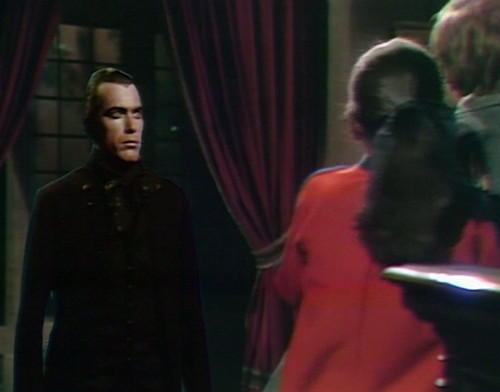
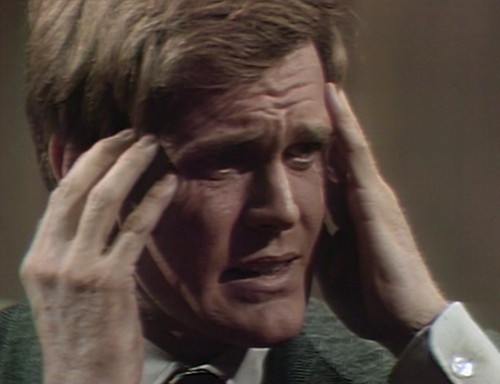
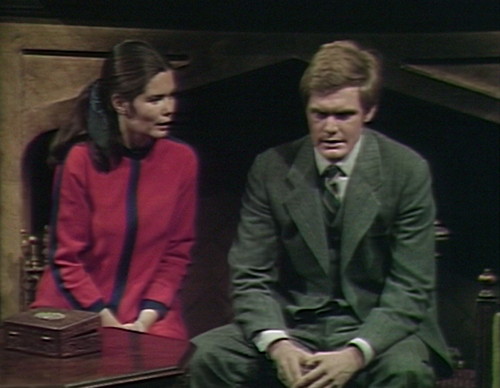
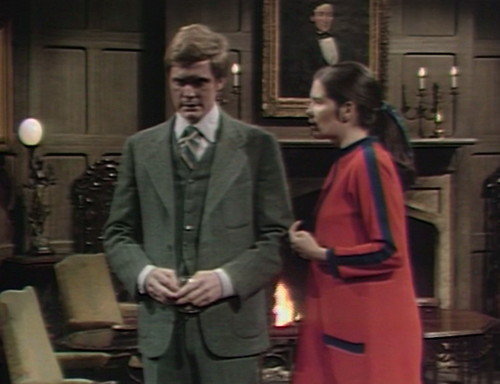
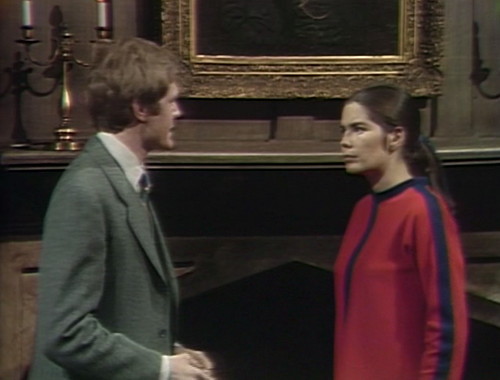
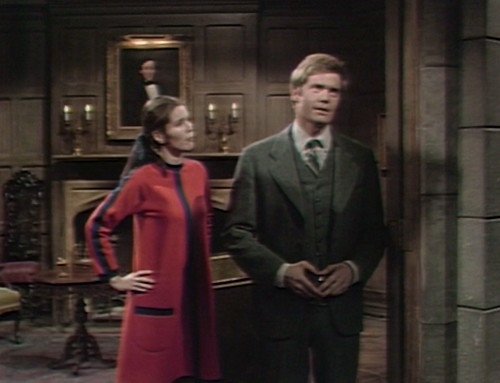
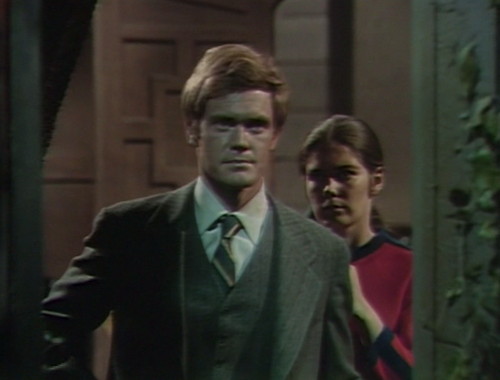
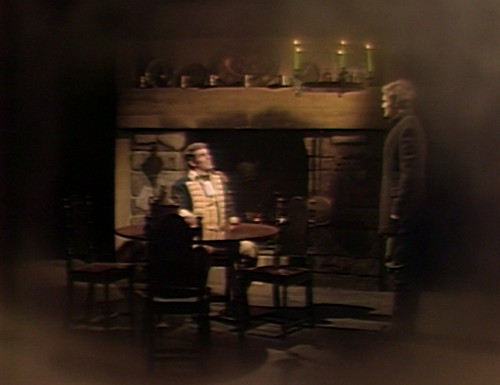
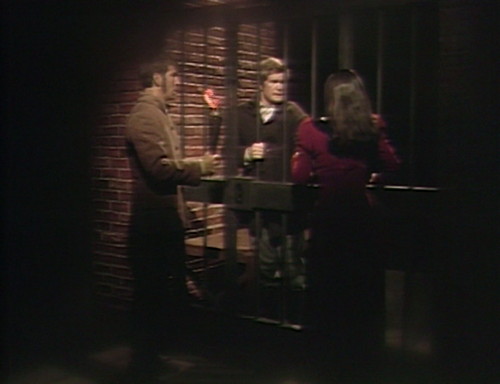
Danny, I got Barnabas and Company, and Joan Bennett and apparently lots of other people except Lara Parker disliked Roger Davis. Its amazing that as viewers we picked up on his distasteful personality. Or maybe not so amazing because he was such a bad actor. Great Book, THANKS.
Awesome, I’m glad you liked it! Yeah, it seems like Roger Davis was super annoying, and — as often happens on soap operas — his personality was reflected in the characters he played. Starting with Jeff, he’s basically just a loudmouth, ranting jerk.
Kathryn Leigh Scott kept a journal while she was shooting “House of Dark Shadows” and she printed excerpts in The Dark Shadows Movie Book. It’s almost entirely about how irritating Roger Davis was.
Why especially in soap operas does actors personality reflect in their character?is it because of the nature of writing a 5 episode a week show? Just curious, if you have time to answer, Danny.
I’ll let Danny your specific question but I’ll just add my standard tepid defense of Roger Davis. Starting with Jeff Clark, all of his characters are either false romantic leads (the “obstacle” to the pairing the audience would like to see) or antagonists (Ned Stuart is a threat to Chris Jennings, who we like despite his shaggy dog issues).
Even when Joel Crothers played a villain, it happened slowly. Nathan Forbes started out as a fun, charming rogue who was a friend to Barnabas and an ally to Victoria. Once he turned rotten, we already kind of liked him.
Could we like Jeff Clark or Ned Stuart or Charles Delaware Tate if someone like Joel Crothers or David Selby were playing them? It’s hard to say — so much of a character does come from the actor, especially on soap operas. But as written, none of these characters, to quote Danny, “make a friend” or “make a joke.” They make plot points happen but since those actions are antagonistic, this just makes us dislike them more.
He wasn’t that bad for Pete’s sale we are talking about a cult soap here not a John Hughes movie.
What does that mean, though? I don’t think John Hughes movies are all that great.
Thank you Lisa. I for one don’t get the hatred of Roger Smith and his characters. I think his acting is as good as most on the show and he’s definitely pleasing to my eyes.
Thank You! Completely agree!
John Hughes movies had bad acting in them. What exactly was your point?
Idk… He comes across as almost abusive, definately verbally, towards Vicky. I can’t see how they allowed his interpretation to come across that way. It’s not subtle.
Yeah, I think the constant pace of daily production makes the character drift closer to the actor’s personality over time. For one thing, the writers are watching the actor’s performance, so there’s already a built-in feedback loop.
Also, on a long-running soap, the actors usually last longer than the writers do. That’s even happened in the two years of Dark Shadows so far — the writing staff has basically turned over twice so far. The writers don’t have the time (or the technology, in 1968) to catch up on everyone’s backstory, so the actors are the ones who hold the long-term memory of what their characters are like. The actors fill in the gaps when the writers change.
The clearest example on Dark Shadows is Roger, who started out as a real bully, and the major villain on the show. Fast-forward twelve months, and Roger is relaxed, and charming, and good-humored — basically, he’s Louis Edmonds. Thayer David took the same journey, but it took three characters to get him there — Matthew Morgan, Ben & then Professor Stokes, who’s clearly just Thayer David in a good mood.
In the absence of a pilot to kick off the show, they were referring instead during those early episodes to Art Wallace’s “Bible” for the series, Shadows On The Wall, particularly when Wallace himself was writing the earliest episodes. By the way, I managed to locate a secondhand copy and have placed my order–for $250! That’s nearly $3 a page, but hey, it’s the series Bible, so why not?
The first transformation from a character as written to a character as an actor’s personality occurred in the case of Maggie Evans, the tough-talking waitress in the blonde wig who’s “everybody’s pal but nobody’s friend” and who is soon toned down once the qualities of actress Kathryn Lee Scott become apparent.
Hey guys, great insight and observations. The best part of this show, like all good forms of entertainment, is that A. You keep going back to re_ read or re,,,_watch, and the discovery of different depths, perceptions of storylines are revealed. Plus the insights of experts and regular folk ( that’s me) round out the whole experience, until sometimes it feels positively Shakespearean, albiet with the ralston purina lamp, the afghan, and.the Smith brother portrait.
Yeah, for sure. It helps that it was a half-hour show that was only on for 5 years — it’s actually possible to watch the entire rise and fall of the show over 1,225 episodes. You couldn’t possibly do that for General Hospital, which is currently airing episode 13,000+ and counting.
KLS is a great example. Also, I think Maggie’s character needed to be softened somewhat because of Sam’s guilt over Burke. She needed to show concern and support over what he was going through, which is hard to so when you’re a tough broad.
The problem with these changes is that they removed all the conflict from the modern-day Collins family, which rendered them boring stock characters who paled next to Barnabas and Julia. Carolyn and Vicki are best buddies — when there was untapped potential for “sibling” rivalry. And Elizabeth and Roger only seem to argue — if at all — in a “loving” manner. A happy family is dramatic death for a soap opera.
The resolution of the initial Burke Devlin storyline might have humbled Roger somewhat but it’s a shame we lost so much of his villainous bite. I could see the 1966 Roger willingly marrying Cassandra — even knowing and approving of her being a witch and attempting to take control of the Collins fortune.
1795, 1897, and 1840 are far more compelling because the Collins family of those periods are — to quote Tolstoy — each “unhappy in their own way.”
Have you seen this interview with Roger Davis? If you’re watching the DVDs that were released a decade or so ago, then this one would have been a bonus feature around now.
It’s amusing because Davis admits to being as bad as everyone says he was. He seems to lack the self-awareness necessary to even play innocent.
And my God, those sunglasses.
We’ve had our share of fun ridiculing Addison Powell’s performance on this show but to deliberately sabotage another actor, as Davis admits to doing, is really deplorable. One of my favorite scenes in 1897 is when David Selby yanks Davis’s hand out of his face, which was blocking him during the shot.
But he was married to Jacklyn Smith because there is no God.
In volume 26 of that DVD set there are clips of earlier convention footage and Roger Davis is talking about how “we’d” cut up and just have fun. And as he’s saying this Donna Wandrey, who’s sitting beside him to his right, turns to look at him as he speaks. She had been smiling at that point, but as she turns her head slowly to look at Roger you can see the smile fade to a look of blank disdain. And then Marie Wallace breaks in to tell the audience about how Roger used to throw her right out of frame and then after would come up and apologize profusely, even though he’d do it over and over again, and then as she’s grinning ruefully she looks out at the audience as she says to Roger “And you know what? I never believed you!” Then in the next shot we see that Donna Wandrey has shifted her position in her seat so that she’s now sitting sideways and has her back completely turned to Roger. Hilarious!
I pasted this link into an earlier post on this blog a few months back, but it’s worth having another look. It’s a write-up on Roger Davis from Movie Stars magazine from 1973. Apparently, he did have some appeal, at least to a few people, and Dan Curtis certainly liked him–enough to keep bringing him back to play someone else once his character gets killed off. In fact, Roger Davis was the first cast member Curtis brought back in this fashion.
http://www.asjcollection.com/current/model.html
Jeff Clark makes no friends — aside from Vicki*, he’s generally humorless, and he contributes nothing to the plot. So, yes, the audience is not inclined to like him very much.
Let’s compare him to Nicholas Blair — the clear villain of the story, but he’s witty and charming and moves the plot along like a chess master. Naturally, we’re excited whenever he appears on the screen. And he even makes “friends” in a dastardly way. His interactions with Adam, Angelique, and Maggie are compelling. I think one scene between him and Maggie often wind up on “best of DS” collections.’
Jeff and Vicki are irredeemably dull in scenes together — mostly because of the reasons you mention. There are no real stakes in their discussions, so the audience drifts off. It should be Vicki’s top priority to prove that Jeff is Peter Bradford because PETER BRADFORD IS THE MAN SHE ACTUALLY LOVES. Jeff Clark is a stranger with a mysterious past who just looks like Peter Bradford. If she’d never gone to 1795 and had met Jeff at the Blue Whale, it’s unlikely he would have made her suddenly forget Burke Devlin. And Jeff should either want to prove that he’s Peter because that means he’s worthy of her love or should want to “win” her love as Jeff Clark. He accomplishes neither tasks and just, as you say, sulks.
BTW, I think the only Roger Davis character I enjoy is Charles Delaware Tate. He’s another Davis Jerk (TM) but he’s intended to be an antagonistic character. And the scenes between him and Thayer David are enjoyable, but perhaps because Thayer David could act with plywood and still engage an audience.
The one element the writers never explained is how Dr. Lang happened to meet up with Jeff Clark. Was Lang out on a graverobbing errand one night and then Jeff Clark/Peter Bradford just happened to stumble through a time travel vortex and wander into the cemetery all groggy and disoriented? How did Jeff Clark/Peter Bradford wind up in the institution? Did Dr. Lang create Bradford’s 20th century name and identity for him and take advantage of his amnesia to make him his assistant and later guinea pig for his experiment?
I just wish that some effort had gone into explaining how Peter Bradford wound up in the 20th century and how he came to be associated with Dr. Lang, but I suppose this would have required more screen time for Roger Davis, and I know that no one would have wanted that.
I believe Clark states at one point that he was discovered walking around with no memory and clutching a piece of rope. He was then involuntarily committed apparently for no real legal reason that occurs to me. Lang lied and claimed he was a murderer so that he’d assist him in his experiments.
It still doesn’t explain how Clark and Lang came to be associated. Perhaps Lang had access to the institution where Clark was committed and was trolling the patient floors in search of someone he could easily manipulate and decided on Clark. At any rate, I suppose exposition for this aspect wasn’t necessary, given the B-movie-level type of script the storyline was operating under at that point.
Re: the question about creating Jeff Clark’s name and identity, yes, it was Dr. Lang. Jeff/Peter says so in the previous episode. Also, although not a lot of details are provided, Lang was established as somehow being on Jeff’s case when he was committed–Jeff even goes to find (and does find) Lang’s medical records about him after Lang dies.
In any case Clark’s real mystery is not “where did he came from” but “when does he get back there?”
I dislike the Roger Davis characters so much I have to draft ‘alternate’ storylines in which he NEVER reappears after 1795 and Vicki goes in search of Burke in South America – at least Vicki and Burke had a history from Episode 1 and this would have made a much more satisfying ending when Alexandra Moltke left the show.
Hey guys, great insight and observations. The best part of this show, like all good forms of entertainment, is that A. You keep going back to re_ read or re,,,_watch, and the discovery of different depths, perceptions of storylines are revealed. Plus the insights of experts and regular folk ( that’s me) round out the whole experience, until sometimes it feels positively Shakespearean, albiet with the ralston purina lamp, the afghan, and.the Smith brother portrait.
The other problem I have with Roger Davis is that he goes overboard when he has to physically interact with the other actors. He kisses like a Dementor, and generally goes around molesting everyone.
It doesn’t help that the 1968 storylines have a serious pacing problem. One of the things I’ve found with this year is that plots are introduced and then put on the backburner for a month or more, and then haphazardly picked up again. You see this with Cassandra, the Dream Curse, Liz’s death fetish and worst of all, Jeff/Peter. The Jeff/Peter storyline is the worst of all because when we do inevitably come back to it, there’s NO advancement in the story at all. It just keeps going around in circles – sure Jeff does stuff like help in the Eve experiment, but it doesn’t actually further the story of his identity, which we’re supposed to care about, but really we don’t. I don’t know if this is the worst DS storyline, but it’s up there.
The Jeff/Peter storyline is incredibly frustrating. Essentially, Peter loves Vicki so much that he crosses time for her…. yet as Jeff Clark the fact that he might be Peter Bradford (a dead man) means he can’t love Vicki. That’s not an ironic twist. It’s just annoying.
Eve is thrown in as an obstacle to Jeff/Vicki but it’s a huge coincidence that Danielle Roget — the most evil woman in the world — somehow fell in love with Peter Bradford. And since Nicholas’s scheme collapses primarily in part of Adam’s jealousy over Eve/Jeff, I always feel like the storyline “cheats” at the finish line.
Everything that Jeff wants is resolved once he learns that Lang lied to him about having murdered someone. After that point, he has no real interest in discovering whether he’s Peter Bradford or not. Vicki does because, as I’ve mentioned, Peter is the man she loves. Jeff just happens to look like him. If he’s not Peter, he’s the luckiest guy in the world as he “inherits” her affection without doing much (as Jeff Clark) to earn it.
Excellent analysis. Makes me hate Jeff/Peter even more : )
So true… except for the luckiest guy in the world part. After all, this is Vicki we’re talking about. ;p
I never really cared whether Jeff/Peter discovered who he was but seriously I did care who Vicki was – the whole premise of the show started with her coming to Collinsport to search for her ‘past’ – accepting the job as David’s governess was only a way to accomplish this goal – if she wasn’t invested in finding out where she came from she probably would have left after the David shenanigans with attempted murder of his father, as well as Roger’s ‘head games’ – once again I had to create an alternate story if only for my own satisfaction – I really hate ‘dangling’ endings and ‘red herrings’ without the accompanying conclusion. Also Liz was too cold towards Vicki (in my opinion) in too many situations to actually be her biological mother. My choices for her folks are….Betty Hanscomb (actually the ‘half-sister’ of Liz and Roger) and none other than Bill Malloy (overly dedicated family friend) – don’t laugh, this is what I do to relieve boredom on long flights, waiting in doctor’s offices, etc…
I used to think Vicky was Betty Hanscomb’s daughter with Paul Stoddard, hence Liz’s feelings of guilt (since she ‘killed’ Paul; possibly drove Betty away) yet also coldness (since Vicky was the product of Paul’s infidelity).
And I agree with you 100% – the non-resolution to Vicky’s character is one of my biggest disappointments with the show. Scratch that – it IS my biggest disappointment with the show.
I was under the impression that it was Liz’s daughter with the butler named Hanscom. But you may be right–Art Wallace in his Shadows On The Wall, the “Bible” of the early part of the show, outlined that indeed she was Paul Stoddard’s daughter, as Liz didn’t seem the type to be having illicit affairs.
They were indeed going to resolve the issue of Vicky’s lineage in 1967, but then along came Barnabas–which was never foreseen in Shadows On The Wall–and all else that was outlined in the series “Bible” was set aside and shelved.
Prisoner, that’s the conclusion I came to, also! If Liz was Vicki’s mother and Vicki looks like Betty, who was the daughter or niece of the Collins family butler, that’s a logical conclusion, I think.
I have read that originally she was to be Betty and Paul Stoddard’s daughter, which I think is more consistent with the on-air relationship between Liz and Vicki.
That makes sense because at one point Viki found a portrait that looked just like her. Liz had Roger say there was a resemblance, but not that much. Then Caroline walked in and said basically Wow when did you get your portrait painted Viki? Which blew Liz’s whole thing out of the water. So at that point it probably was that the woman in the portrait was Viki’s mom. If they had moved faster, or if Moltke had stayed her mother could have been who knows what a witch, another vampire, or God help us, part of the Leviathan storyline with Viki playing the intended Leviathan bride instead of Caroline.
Yes, I prefer that to the fan idea that Vicki was Liz’s daughter (one I think even Joan Bennett endorsed), which is something I call “dramatic redundancy.” Liz treated Vicki like a member of the family and confided in her — especially during the Jason McGuire blackmail plotline). Revealing that she’s her biological mother just falls flat. This is something you see a lot in fan fiction: For instance, pairing Barnabas and Julia romantically. They already function like a married couple so all you’ve done is diffuse the tension of Julia’s unrequited devotion.
Anyway, Liz growing to love someone who represented her husband’s betrayal of her and who she originally viewed only as a sense of burdensome responsibility is dramatically compelling.
Unfortunately, even by this point in the series, revealing Vicki’s origins would require something bigger and (presumably) supernatural. Her parents might have been Leviathans who left her in Collinsport before being destroyed in a battle with Gerard’s ghost (see what I did there?). In a way, the “who is Victoria Winters” plotline was never resolved because the original DARK SHADOWS for all intents and purposes was cancelled. There’s a generation of fans who only saw the show beginning with episode #210 — and it’s actually not that hard to follow. We are in a way “reintroduced” to all the characters through newcomer Barnabas.
What’s interesting about 1968 is how it works as a sequel to 1795: Angelique, 1795’s antagonist, returns to torment Barnabas some more. Professor Stokes is a descendant of Ben Stokes. Tony Peterson is conveniently linked to Reverend Trask. Vicki’s “lost love” and rival to Barnabas for her affections is now Jeff Clark/Peter Bradford. There’s no mention of Burke Devlin (and no one even comments that she’s gotten engaged to another man less than a year — and possibly less in “story” time — after her first fiancee vanished). Even Eve is given a connection to 1795 (an inexplicable one). And Sam Evans and Joe Haskell are pretty much collateral damage to the new direction of the show.
It occurs to me that not even 1897, which ran twice as long, had as much an impact on the following storyline — aside from triggering it. But once Quentin is assimilated into the modern day, there’s little mention of the people and characters from 1897, although we will revisit 1795 often. It even forms the foundation for 1840 in major ways.
why is jeff/peter sleeping at maggie’s house? i’m sorry i must have missed something!
He’s renting a room while he gets on his feet. I forget exactly when they talked about it, because who even cares what happens to Jeff.
Jeff needed to get away from Addison Powell.
Like a sane person.
Vicki asked Maggie to let him move in.
Maggie said okay.
Like an insane person.
is it ok to say i miss david ford? i always got a kick out of him.
Blooper/discontinuity–When Maggie comes downstairs at Collinwood to go back home, Jeff comes out into the foyer and says he’d better go to the cottage and get his things because it wouldn’t be appropriate for him to stay there now that Sam is gone. But later, Joe and Maggie are there, and Jeff walks into the cottage and says he’s going to bed–and does.
“Blooper/discontinuity–When Maggie comes downstairs at Collinwood to go back home, Jeff comes out into the foyer and says he’d better go to the cottage and get his things because it wouldn’t be appropriate for him to stay there now that Sam is gone. But later, Joe and Maggie are there, and Jeff walks into the cottage and says he’s going to bed–and does.” I’m on a rewatch, and that was my comment from several years ago. Watching again, I see I was wrong to note this “blooper.” While still at Collinwood, Maggie does tell Jeff that it’s late and he doesn’t have to leave that night, that he could wait until the next day.
But would that mean Jeff Clark was staying at Collinwood?? That sounds too modern, even if it meant he would stay in another bedroom. Didn’t he just return from Portsmouth?
Here’s a question about the production of this episode. In the final scenes, which are repeated in the next episode, Jeff/Peter has a dream encounter with Nathan Forbes. Immediately after the dream, Jeff and Joe struggle. It would seem that the needed costume changes could not be accomplished in real time. The dream sequence must have been pre-taped. Is this the case?
I suspect that the dream sequence was pre-taped.
Maybe the Jeff/Vicki storyline could have gone somewhere if the Davis & Moltke showed any type of chemistry between the two of them. It might have inspired the writers better. Jeff/Peter is supposed to have loved Vicki so much, that he traveled 200 years to be with her. But, looking at the two of them together, its just impossible to believe that. There is never a tender moment between the two of them. Well, at least he’s not slapping Vicki anymore.
I love how Vicki says she “managed to travel to the past”, like it was something she was actually trying to do and made happen all by herself.
I have this theory that Jeff is seriously into Joe (hey, who isn’t, right?) which is why he has zero chemistry with Vicki. He spends a bit of time in the Collinwood foyer staring at Joe intently, has a deeply Freudian dream where he’s dressed Joe up as a sexy 18th century rogue that laughs at him when his gun goes off somewhat ineffectually, then wakes up and puts his hands all over Joe’s throat which, as we saw at the end of the previous episode, is Jeff’s standard prelude to a (terrifying) kiss…
Say what you will about ‘chemistry’ or ‘charisma’ – or lack thereof – but Jeff is super-shouty, and constantly arguing with Vicki; in this case, shooting down anything she suggests about ways to find out who he is, despite his supposedly having just spent weeks in Portsmouth trying to find out exactly that. Why is she interested in him at all? Just because she’s sure he’s Peter, who was just as loud and crabby. I agree that the stakes in this storyline needed to be bigger. (I actually yelled at my computer screen when the scene break came back and we were STILL watching the Vicki/Jeff scene. And ALL THEY DID WAS RECAP what they’d been talking about before Joe came to pick up Maggie!)
On the good side, though, we DID get to have Joe Haskell AND Nathan Forbes onscreen. Except (TINY nitpick) Joe should have taken off that shirt and jacket before bunkin’ down – they’ll get all wrinkly. Maybe the pants too. And the fight would have been much more compelling between Jeff and Underwear Joe. Just saying. (Do you suppose Joe goes boxers or briefs? The romantic in me says commando.)
Seems like a variation on the pursuer becomes the pursued. First Vicki wants to urge Jeff toward being Peter, and Jeff doesn’t want to be Peter; then Jeff decides to accept being Peter and now Vicki doesn’t support him. (Maybe it is just his cologne.) DS characters have given mixed signals before. Think of Carolyn when she was Barnabas’s minion. First she urged Barnabas to get Julia, yeah, get her good; then she said, don’t get Julia because it’s too cruel.
I thought it was weird how the director shot the dream scene between Bradford and Forbes almost entirely in wide shots. I suppose they could’ve been trying to create a sense of distance to emphasize that it was a dream but it comes off as very awkward.
I am rewatching this, loved the show as a child. I always loved Barnabas and Vicki (I think Alexandra Moltke had more skill than she was allowed to show) but i HATED Burke (abusive towards Vicki, constantly telling her what she should and should not like and how she would feel after her marriage) and Jeff was just an unpleasant surprise. Jerk law student who she came to depend on when she was terrified and imprisoned.
“When Jeff goes to sleep at the Evans cottage, he walks through the door that we’ve seen many times as Maggie’s room. This isn’t really a blooper, just a quirky thing to notice — they’re not going to build a whole extra part of the set just to give Jeff a different bedroom door — but it’s a funny head-scratcher moment for viewers who have been watching attentively.” Well, there IS a blooper in here because the room Jeff is sleeping in (Maggie’s old room) is laid out differently from Maggie’s old room.